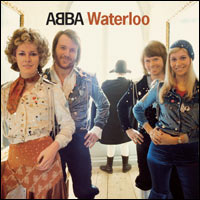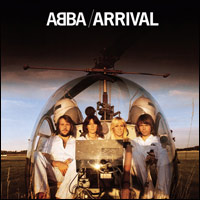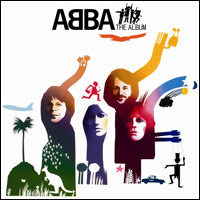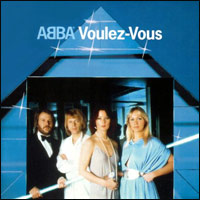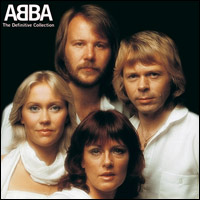Randy's Rodeo
music that rocks, rolls, swings, and twangs
| Artist Index | Song Index | Radio | Home |
|
Music Reviews Special Features Information Support Me |
Sock it to me, Santa!
On the other hand, ABBA were quintessentially a singles band, and we shouldn't let rock critic and record geek revisionism (or media-driven nostalgia) convince us otherwise. The true legacy of ABBA is what's become known as Europop - white as white can be, vacuous, irresistible, catchy as hell - think Roxette, Ace Of Base, Kylie Minogue, or the Spice Girls. Horrific, for sure, and that's just scratching the surface. It's just that ABBA did it first, and they did it very, very well. In its finest moments, the music of ABBA is the purest of pop - at once a towering achievement and an ephemeral self-indulgence, the very definition of a sublime pop experience. But no matter how they sound, songs like "Dancing Queen" and "Waterloo" feel delightful - and that's the point. [close]
With their 1973 debut - and a victory in the Eurovision song contest - ABBA began to amass quite a legacy in their home country. Their American breakthrough, however, came in 1974 with the juggernaut "Waterloo." Approximating the density of Phil Spector's legendary Wall of Sound, "Waterloo" set a high water mark that ABBA would reach but a few times in their long, successful career. From its locomotive beat to its clever lyrical conceit, "Waterloo" stands as not only one of ABBA's best songs but as one of the best of the decade. The problem is, other singles from ABBA's early albums - Ring Ring (1973), Waterloo (1974), and ABBA (1975) - resemble bubblegum pop more than Spectorian rock. Now, I love the bubblegum music of the 60's, and songs like "Ring Ring," "Honey Honey," "Mamma Mia" bear some resemblance to the saccharine classics of that era. But, these fledgling ABBA records were quintessentially silly, and, as such, they grow undeniably annoying upon repeated listens. Despite another hit that rivaled the lofty musical achievement of "Waterloo" ("S.O.S.", 1975, the only charted hit where both the artist and title are palindromes), ABBA's early repertoire bode poorly for their place in history.
Over the years, however, ABBA's music matured considerably, occasionally brushing up against the sublime. It would be overreaching to say that ABBA achieved gravitas, but later records - like The Album (1978), Voulez-Vous (1970), and Super Trouper (1980) - were demonstrably more consistent and sophisticated than the sugar-laden pop that established the group as global superstars. Often with sophistication comes pretension, and pseudo-concept records like The Album were often as insufferable as they were impressive. Yet, many of ABBA's later singles achieved things that could not have been predicted on the basis of "Ring Ring" (1973). In particular, "Dancing Queen" (from Arrival, 1977) is glorious. In a certain light, "Dancing Queen" could be dismissed as ABBA's disco record; nearly every major artist made one during the height of disco fever (Rod Stewart, Kiss, and the Rolling Stones, to name a few). But, when viewed as a distillation of ABBA's music to its very essence - beat, melody, romance - "Dancing Queen" is, like "Waterloo," at the top of its class. The propulsive beat, the soaring harmonies, and the hedonistic lyrics of "Dancing Queen" combine in the sort of evocative, visceral vision that is the hallmark of great pop. Further, songs like "Fernando" (1976), "Knowing Me Knowing You" (1977), and "Winner Takes It All" (1981) evidence an emotional depth - not to mention studio craft - one never would have suspected when listening to ABBA's earlier releases.
Almost immediately, ABBA began expanding their empire via solo recordings and ambitious stage productions. Frida cracked the Top 20 in 1982 with her Phil Collins-produced single, "I Know There's Something Going On," and Benny and Bjorn collaborated with Tim Rice on a musical, Chess, that spawned Murray Head's Top 10 hit, "One Night In Bangkok" in 1985. But as the 1980's progressed, the rise of modern rock and the growing predominance of American acts made the decade a quiet one for ABBA. Unexpectedly, however - and without recording is single new note - the 1990's became almost as profitable for the mellifluous Swedes as the 1970's had been. Thanks to prominent placement in several movies (including Muriel's Wedding and Priscilla Queen Of The Desert) and a seemingly endless series of tribute albums (by Erasure, among others), ABBA became hipper than ever - even if that hipness was fraught with irony and loaded with camp. The release of ABBA Gold (1992) and More ABBA Gold (1993) sealed the group's return to the upper reaches of the charts.
Fans that actually survived the 1970's will fondly remember the immensely popular Greatest Hits (1976) and Greatest Hits Vol. 2 (1979); both albums were reissued on CD but have been roundly eclipsed by the aforementioned Gold sets (also sold in tandem as Forever Gold). More recently, there's Number Ones (2006), a jam-packed single-CD collection. Even better, though, is Polygram's The Definitive Collection (2001) which is precisely that - definitive. For the first time, consumers can sit down with one affordable package and neatly survey all ABBA's hits in chronological order. With thirty-seven singles spread over two CD's, The Definitive Collection is the only ABBA album most of us need ever own... when all is said and done. For the faithful, there's also a boxed set, Thank You For The Music, which is exhaustive but exhausting - all the singles plus album tracks, b-sides, and unreleased material. Normally, I love a good boxed set, but I recommend Thank You For The Music for only the severely ABBA-obsessed collector. And if that's not enough, seek out the lavish, import-only, 9-CD boxed set, Complete Studio Recordings (2005), including a disc of rarities and two DVD's. Ring! Ring! Speaking of which, ABBA's eight original albums (plus ABBA Live) have historically been fitfully available in the United States - constantly being issued, deleted, and reissued. But, they are always in print somewhere around the world, and the last round of reissues (circa 2001) not only improved the sound but added bonus tracks to nearly all the discs. Mamma Mia! [top of page]
Your witty comments, impertinent questions, helpful suggestions, and angry denials are altogether encouraged. Submit feedback via email; submissions will be edited and posted at my discretion. July 27, 2002. Just a note to say thanks for listing my site The ABBA Experience - my first stab at a web site - in your ABBA links section. It's great to have a new gateway in to my site. Your site is very interesting and well laid out. - Vince Thorne |
|
|||||||||
Navigation Artist Index Song Index Randy's Radio Home Top Of Page Music Reviews Alternative Blues Books Christmas Classic Rock Country Jazz Lounge Special Features History Of Randy's Rodeo Sex Pistols Motown Records Halloween Valentine's Day Information About Me Feedback Links User's Guide Support Me Amazon iTunes Sheet Music Plus © 1999-2025 Randall Anthony, www.hipchristmas.com and www.randysrodeo.com |
|||||||||||

